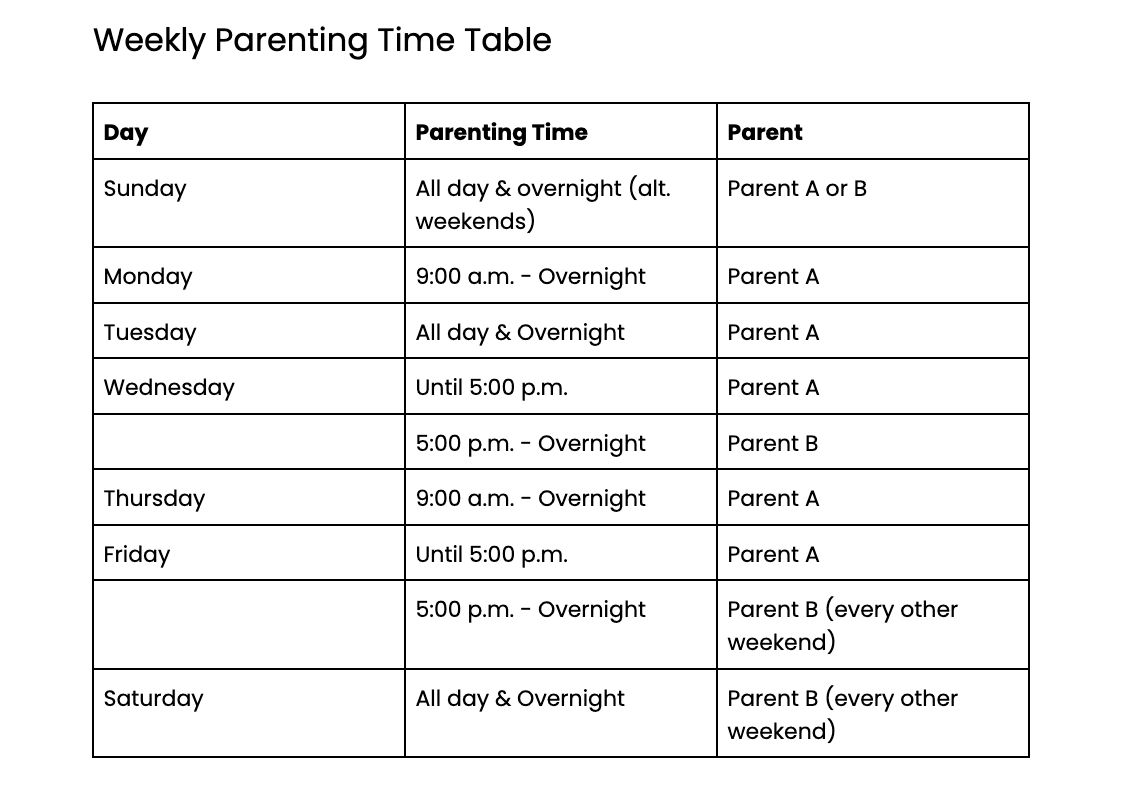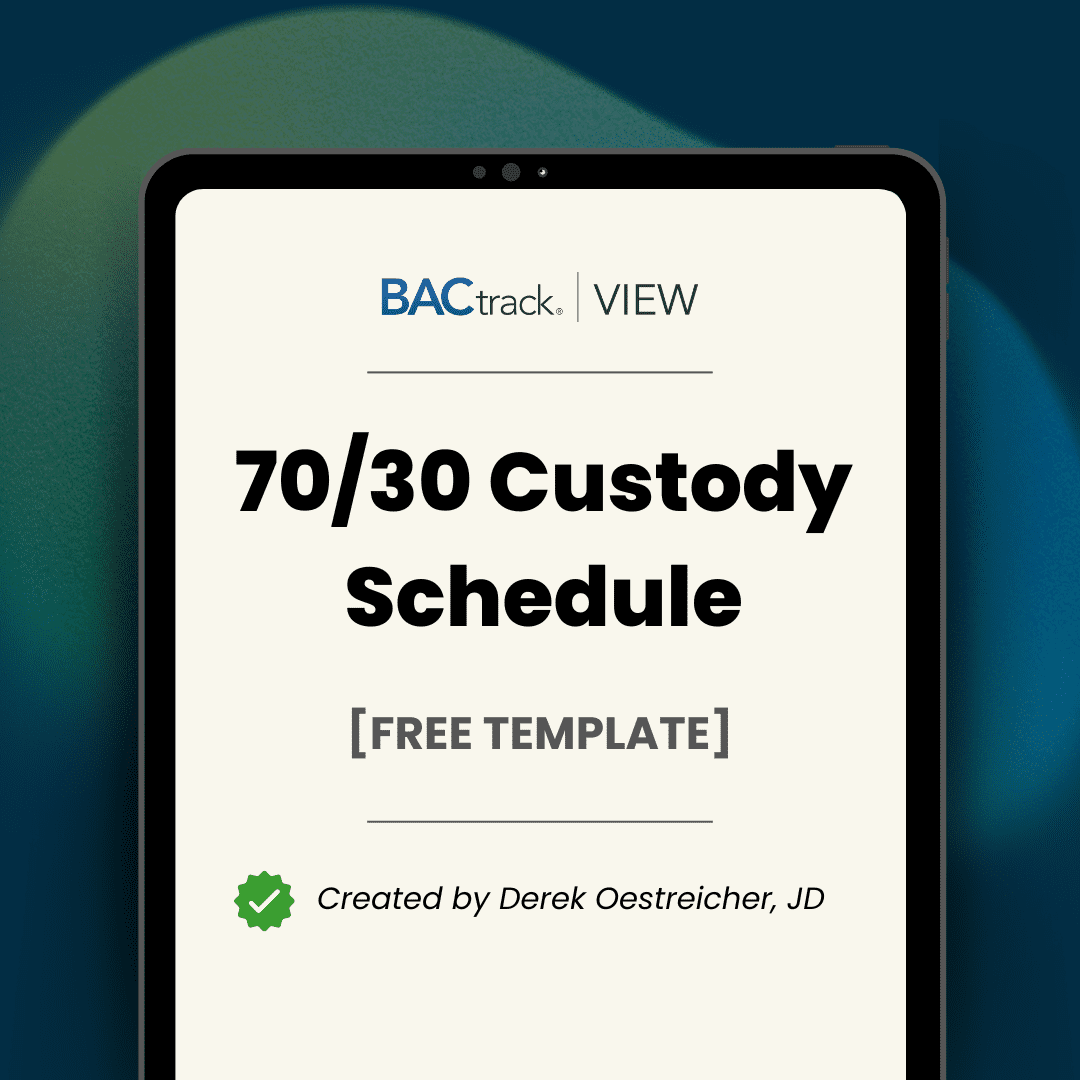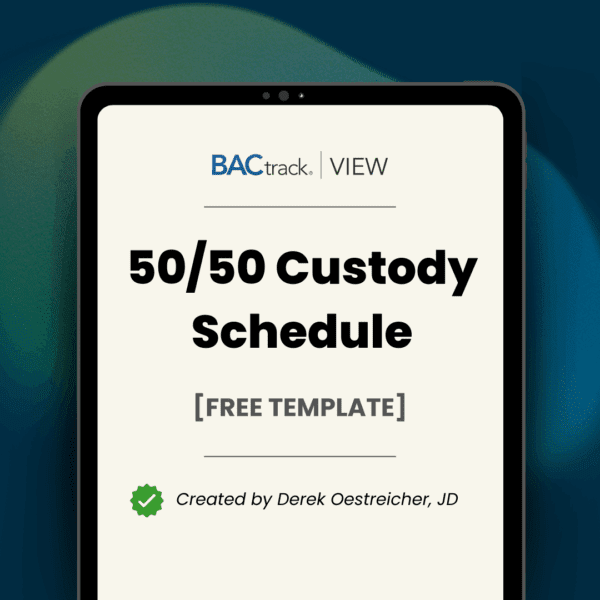As a family law attorney, I’ve worked with countless families navigating the emotionally complex terrain of divorce and custody. One thing I always stress with my clients: Your parenting plan should serve your child’s best interests while being realistic about your family’s unique circumstances. For many of my clients – especially when one parent has less flexibility or when co-parenting communication is strained – the 70/30 parenting plan offers just the right blend of stability, consistency, and meaningful contact.
I’ve seen the 70/30 schedule transform tense, uncertain situations into cooperative, child-centered solutions. Whether it’s helping a parent maintain a strong connection despite work travel or providing structure for a recovering parent rebuilding trust – this plan has been a tool for healing and hope.
Let’s walk through how this parenting plan works – and why it might work for you.
70/30 Custody Schedule Template
What is the 70/30 parenting plan?
In a 70/30 custody arrangement, one parent (usually called the primary residential parent) has the child roughly 70% of the time – around 255 overnights per year – while the other parent has about 110 overnights. This is still considered a form of joint custody, and the non-primary parent continues to play a consistent and meaningful role in the child’s life.
A common structure for this schedule is the “every-other-weekend + one midweek overnight” model. Here’s a typical example:
- Parent A (Primary Parent): All days except Wednesday overnights and every other weekend.
- Parent B (Non-Primary Parent): Wednesday overnights and Friday evening to Monday morning on alternate weekends.
This schedule provides the child with a consistent home base, reduces mid-week transitions, and gives the other parent enough extended time for bonding and shared memories.
A well-structured parenting plan isn’t just a legal tool. It’s a healing structure that provides clarity for kids and confidence for parents.”
When (and why) it works
The 70/30 plan is especially helpful in situations where:
- One parent travels frequently or has a demanding or inflexible work schedule
- The parents live farther apart, making frequent transitions impractical
- There are safety concerns that make limited, structured parenting time appropriate
- One parent is in recovery and working to rebuild consistency and trust
- The child needs greater stability in one home (especially in early school years)
One client I worked with – a mother recovering from substance abuse – was eager to re-establish trust with her ex-husband. We negotiated a 70/30 plan that allowed for weekend visits and one midweek overnight. Over time, as she maintained a consistent and safe presence in her child’s life, the plan evolved to increase her time and involvement.
In another situation, I represented a father whose job required him to travel every other week. The 70/30 schedule gave him focused and uninterrupted weekend time with his son when he was in town, while also ensuring his son wasn’t disrupted (or disappointed) by inconsistent weekday transitions.
This plan provides just enough structure to promote emotional stability for a child and enough flexibility to accommodate modern life.

A snapshot of the Weekly Parenting Timetable in the 70/30 Custody Schedule Template.
How the 70/30 custody schedule helps parents in addiction recovery
When alcohol use has been a concern, trust and safety must be the foundation of any parenting schedule.
I’ve seen firsthand how alcohol monitoring tools like BACtrack View can bridge the trust gap between parents and help ensure a child’s well-being. These tools can provide confidence to co-parents, lawyers, and judges alike.
BACtrack View works by scheduling breathalyzer tests that a parent takes from their phone. The results are automatically sent to the co-parent, attorney, or even to the court. If a test is missed or failed, contingency plans can kick in. These contingencies could include supervised visits or forfeiture of parenting time until a review takes place.
These tools don’t just offer peace of mind to all the parties involved, they also offer a pathway forward for families that might otherwise struggle to keep it together.

Real-life encouragement: Yes, you can do this
If you’re reading this and feeling overwhelmed – know that you’re not alone. I’ve worked with parents in crisis, in recovery, in pain. But I’ve also watched those same parents rise up, rebuild, and thrive.
A well-structured parenting plan isn’t just a legal tool. It’s a healing structure that provides clarity for kids and confidence for parents.
Whether you’re negotiating your first custody agreement or adjusting one to fit a new reality, the 70/30 schedule may give your family the breathing room it needs to heal and grow.
The bottom line on the 70/30 custody schedule
The 70/30 parenting plan isn’t right for everyone – but when it fits, it can function beautifully. This plan offers security, flexibility, and the chance to maintain strong relationships despite difficult circumstances. Add in clear communication, good legal guidance, and tools to keep everyone on track… and you can build something stable. Something hopeful.
Your parenting journey doesn’t have to be perfect. It just has to be faithful. So, go out and do it. Be faithful to your child’s needs and your ongoing growth. You’ve got this.







